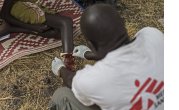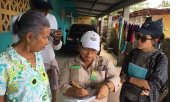Feedback/Comments from Our Readers
|
 Comments, questions and feedback is always welcome. Comments, questions and feedback is always welcome.
|
|
Global Health Rounds - February 12 - Cancelled
|
Thanks to everyone for participating and attending the Global Health Fair on January 29th 2018. As it had been a very busy international week, our next Global Health Rounds will be on February 26th. Please watch this space for more updates.
Congratulations to the winners who submitted a poster for the Global Health Fair:
From the Research posters' submitted the winner was Janelle Johnson and from the medical students’ poster was Courtney Grotski.
We're always looking for new speakers and ideas for topics for Global Health Rounds for this coming up academic year. If you have speakers or topics, please contact Cheryl Knowles at GHFoMD@ualberta.ca |
|
People Affected by Fatal Snakebites in Sub-Saharan Africa are in Desperate Need of Affordable, Quality Antivenoms
|
 Snakebite envenoming permanently disables hundreds of thousands of people and kills more than 100,000 each year all across the globe — more than any other World Health Organization (WHO)-designated neglected tropical disease — even though highly effective treatments exist. More than 20,000 people die from snakebites each year in sub-Saharan Africa alone. While Médecins Sans Frontières (MSF) treats several thousand people free of charge in its facilities annually, most people who are bitten in sub-Saharan Africa live in rural areas and receive no treatment with antivenom (the only validated treatment for the disease), or receive substandard treatment because exorbitant prices put quality treatment out of reach. Snakebite envenoming permanently disables hundreds of thousands of people and kills more than 100,000 each year all across the globe — more than any other World Health Organization (WHO)-designated neglected tropical disease — even though highly effective treatments exist. More than 20,000 people die from snakebites each year in sub-Saharan Africa alone. While Médecins Sans Frontières (MSF) treats several thousand people free of charge in its facilities annually, most people who are bitten in sub-Saharan Africa live in rural areas and receive no treatment with antivenom (the only validated treatment for the disease), or receive substandard treatment because exorbitant prices put quality treatment out of reach.
Fortunately, in March 2017, the WHO classified snakebite as a neglected tropical disease of the highest priority. This year, the WHO will launch an ambitious roadmap to reduce snakebite-induced death and disability. The roadmap will seek to address the lack of access to effective, quality antivenom treatment — one of the main obstacles MSF encounters treating people in places such as South Sudan, Central African Republic and Ethiopia.
To read more about this article go to https://medium.com
|
|
Access to Emergency Hospital Care Provided by the Public Sector in sub-Saharan Africa in 2015: a Geocoded Inventory and Spatial Analysis
|
Summary
Background:
Timely access to emergency care can substantially reduce mortality. International benchmarks for access to emergency hospital care have been established to guide ambitions for universal health care by 2030. However, no Pan-African database of where hospitals are located exists; therefore, we aimed to complete a geocoded inventory of hospital services in Africa in relation to how populations might access these services in 2015, with focus on women of child bearing age.
To read more details about this http://www.thelancet.com/journal
|
|
 In Panama, a vector technician named Orlando goes from house to house, street to street, gathering and tracking data about mosquito breeding sites and disease hot spots.
It’s a difficult job. His success depends on his interpersonal skills, on earning the trust of residents, providing effective education and gaining access to property to pinpoint and assess where mosquitoes breed.
Until this year, Panamanian technicians like Orlando used pen and paper to collect and tabulate information about vectorborne diseases like Zika. It could take up to a week for this data to make its way to central decision makers. By then, untold infections may have occurred.
Around the world, information technology can make a life-or-death difference for communities facing urgent public health challenges. By making it easier to collaborate and analyze data, communities have a powerful tool for improving health—especially when accompanied by sound public policy and collaboration among the public, private and nonprofit sectors.
To read more about this article go to https://www.globalhealthnow.org
|
|
Performance-based Financing in Low-income and Middle-income Countries: Isn’t it Time for a Rethink?
|
Key questions
What is already known about this topic?
- Evidence regarding performance-based financing (PBF) effectiveness is mixed, and there is no evidence about its efficiency and equity.
- Empirical evidence from different settings and disciplines indicates the risks, cost and perverse effects of PBF in LMICs.
- Despite insufficient supportive evidence, PBF is increasingly promoted by donors and implemented.
What are the new findings?
- Consultants and international agencies increasingly play a brokerage role in PBF dissemination, at the expense of domestic initiative and ownership.
- Based on our experience in the field in a wide array of countries, we have observed that the way PBF is actually implemented departs markedly from the ideal of an open approach enabling system reforms in LMICs.
- Too little care is given to system-wide and long-term effects, so that PBF can actually damage health services and systems.
To read more about this article go to http://gh.bmj.com
|
|
|
|
Save the Dates of Local Events!
|
Annual Rich Man Poor Man Dinner Event 2018
April 7, 2018
Time: 6:00 pm to 9:30 pm
Please note if you have any resaleable items for the SIHA silent auction, please email me at GHFoMD@ualberta.ca. Thanks for those who donate. |
|
Conferences, Symposiums & Lectures
|
Save this link to your favorites as I update it daily will all events, symposiums, etc., just click here.
==========================
2018 CUGH Conference
March 16 - 18, 2018
New York Hilton Midtown,
=========================
Global Health & Innovation Conference
April 14-15, 2018
Yale University
New Haven, CT
|
|
Call for Abstracts/Submissions
|
Global Health & Innovation Conference at Yale on
April 14-15, 2018
is calling for abstracts.
|
|
Newsletter & Special Journal Editions
|
|
|